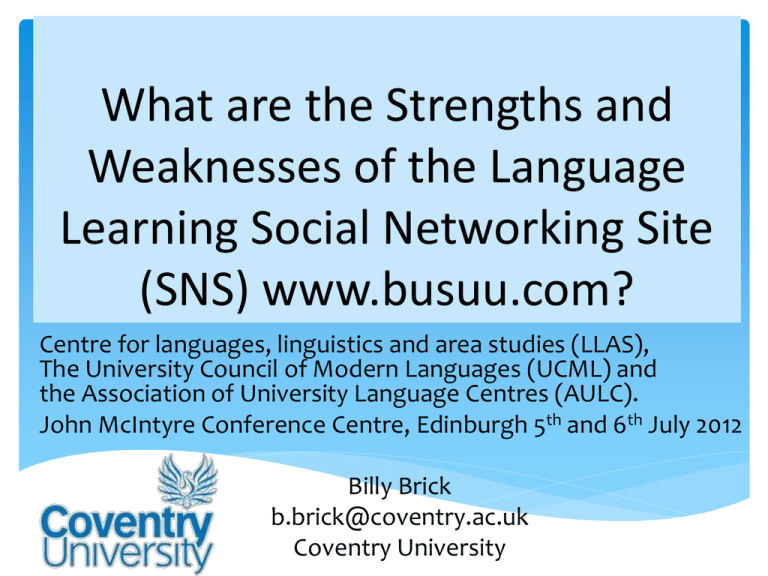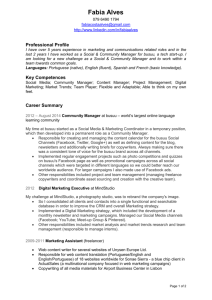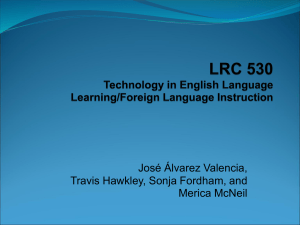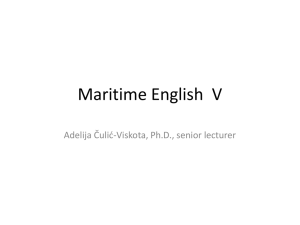(SNS) www.busuu - LLAS Centre for Languages, Linguistics and
advertisement

What are the Strengths and Weaknesses of the Language Learning Social Networking Site (SNS) www.busuu.com? Centre for languages, linguistics and area studies (LLAS), The University Council of Modern Languages (UCML) and the Association of University Language Centres (AULC). John McIntyre Conference Centre, Edinburgh 5th and 6th July 2012 Billy Brick b.brick@coventry.ac.uk Coventry University Overview Web 2.0 SNSs: historical context Examples of SNSs and their functionality Research Projects Results Future directions Discussion 2 13/04/2015 SNSs for language learning are: ’disruptive technologies’ in that they allow for new and different ways of doing familiar tasks. Godwin-Jones (2005) 3 13/04/2015 Principles of Tandem Learning (Little 2003) Learner Autonomy Reciprocity •Driving force of Tandem Learning •Hands over control of learning to the learner •First hand contact with a native speaker of the target language •Equal effort and investment = equal benefit •Asynchronous written environment •Synchronous voice environment 4 13/04/2015 5 13/04/2015 Language Learning SNS Functionality Web-based, or increasingly app-based Freemium model Synchronous voice and synchronous and asynchronous text chat and e-mails Contain picture-based learning materials Peer review of written and spoken submissions Profile matching (languages, levels) Motivational tools (berries, league tables, corrector badges) 6 13/04/2015 1 Individual learning 2 Community learning Marcel + Content based on 150+ different topics (e.g. telling the time, answering the phone, etc..) Grammar material provided by PONS and Collins Supported by photos and voices of professional voice artists Language material available in Spanish, German, French, English, Italian, Russian, Turkish, Polish, Portuguese, Arabic, Japanese and Mandarin busuu.com © 2011 7 teach Susanne teach native medium beginner native beginner Instant video-chat application for direct conversation between users Peer-to-peer correction of writing and speaking exercises by the community Currently around 100,000 unique user visits per day and more than 25,000 text corrections per day. busuu.com is Europe’s largest language learning community with more than 2.5+ million users Growth of community Awards & recognition AlwaysOn Global 250 Winner Today there are more Morethan than 2,500,000 1,600,000 users registered users European Union innovation award in language learning CeBIT Innovation Award Shortlist best European Website Winner Open Talent Competition May 08 busuu.com © 2011 Jan 09 May 09 Jan 10 May 10 8 Mar11 Red Herring European Winner 2010 Freemium Model Premium Vocabulary in English, Spanish, French, German, Italian, Russian, Portuguese Writing exercises Reading comprehension exercises Video Chat Application for live-talk Interactive exams Audio for more than 3,000 key phrases Listening comprehension exercises Printable PDFs for more than 150 units Access to more than 35 Grammar Units Audio Podcasts for more than 150 units Live Video Units Customized Review Travel Courses Voice Recording Feature + more... + Access to detailed Grammar guides! busuu.com © 2011 10 Free busuu.com © 2011 11 The Research 12 level 3 learners spent 3 months learning German on the site – questionnaires, log sheets and classroom observations. Mostly British aged 21. Similar experiment 12 months later. LLAS e-Symposium Practitioners Workshop - 13 practitioners took part in a 3hr workshop and discussion – questionnaires. Mixed European nationalities aged 25-60. 12 13/04/2015 Please suggest any ways in which you think the www.busuu.com university platform could be improved. “More natural pronunciation and dialogues reflecting current and authentic use of language. Dialogues were stilted and overPlease suggest anywith ways whichvoice you playing think articulated, often theinsame www.busuu.com platform 2the parts which makes ituniversity hard to follow. It was could improved. hard to work outbehow to get into things unintuitive interface. The tour wasn't enough to figure out the navigation.” 24 13/04/2015 “Exercises and activities for levels higher than B2.” “It is not challenging enough for students of A level quality." 25 13/04/2015 “In comparing busuu to livemocha, busuu is less structured and it is hard to know 'where to go next' sometimes in busuu. The site navigation seems a bit chaotic.” 26 13/04/2015 Name three things you liked “Access to a real community of learners live chat peer learning.” “Garden metaphor, the berries and the visual design.” “Games, chat, reviews” “I wrote a message to an online student and he responded very quickly. The length of a lesson is good. I like the frequent tests.” “Instant feedback. Self-correcting exercises, social networking.” 27 13/04/2015 Name three things you didn’t like “The lesson tooltip hardly ever gives an indication of the grammar covered. The tests are too predictable, too easy. It would be good to have levels C1 and C2 as well.” “Danger for incorrect feedback. Too open for possible frauds.” “The level was far too basic. My sentences got corrected very quickly (good!) but some of the corrections were wrong - there is no quality control.” “No way to guarantee that feedback received is accurate and reliable Speakers' accents on listening tasks sound artificial.” 28 13/04/2015 29 13/04/2015 Strengths •Basic features free of charge •Immediate peer review and chat with native speakers •Flexibility (anytime, anywhere) •Fun and motivating •Autonomous learning 30 13/04/2015 Weaknesses •Lack of expertise from peer feedback •Need to pay for premium content (and higher levels) •Learning materials could be improved (behaviouristic) •Unsolicited advances and inappropriate advertising 31 13/04/2015 busuu.com © 2011 32 busuu.com © 2011 33 34 13/04/2015 References boyd d m, & Ellison N B (2007), ‘Social networks: Definition, history, and scholarship’, Journal of Computer-Mediated Communication, vol. 13, no. 1, [online] available from http://jcmc.indiana.edu/vol13/issue1/boyd.ellison.html [23rd May 2011] Brick, B. (2011) How effective are web 2.0 language learning sites in facilitating language learning? Compass: The Journal of Learning and Teaching at the University of Greenwich. Issue 3, 57-63 Brick, B. (2011) Social Networking Sites and Language Learning. International Journal of Virtual and Personal Learning Environments. 2 (3) 18-31 (Copyright 2010, IGI Global, www.igiglobal.com. Posted by permission of the publisher.) [31st August 2011] Brick, B, (forthcoming 2012) The Role of Social Networking Sites for Language Learning in UK Higher Education: the Views of Learners and Practitioners International Journal of ComputerAssisted Language Learning and Teaching Godwin-Jones, B (2005) Emerging technologies: Skype and Podcasting. Disruptive technologies for language learning. Language Learning & Technology, 9(3), 9-12. Guo, S (2010) From printing to Internet, are we advancing in technological application to language learning? British Journal of Educational Technology Vol 41 No 2 E10-E16. Harrison, R . & Thomas, M. (2009) Identity in Online Communities: Social Networking Sites and Language Learning. International Journal of Emerging Technologies & Society Vol. 7, No. 2, 2009, pp: 109 – 124. [Online] available from <http://www.swinburne.edu.au/hosting/ijets/journal/V7N2/pdf/Article4-HarrisonThomas.pdf> [23rd May 2011] 35 13/04/2015 Hurd, S (1998) “Too carefully led or too carelessly left alone”? Language Learning Journal, No 17, 70-74 Little, D. (2003) Tandem Language Learning and Learning Autonomy. In Lewis, T. and Walker, L. (eds.), Autonomous language learning in tandem. Sheffield: Academy Electronic Publications Little, D. (2003) Tandem Language Learning and Learning Autonomy. In Lewis, T. and Walker, L. (eds.), Autonomous language learning in tandem. Sheffield: Academy Electronic Publications McBride, K (2009) Social-Networking Sites in Foreign Language Classrooms In Lomicka, L., & Lord, G. (Eds.) The next generation: Social networking and online collaboration in foreign language learning . San Marcos, TX: CALICO Book Series Mullen, T., Appel, C & Shanklin, T. (2009). Skypebased tandem language learning and web 2.0. In M. Thomas (Ed.), Handbook of research on Web 2.0 and second language learning (pp. 101–118). Hershey, PA: Igi Global. 36 13/04/2015






